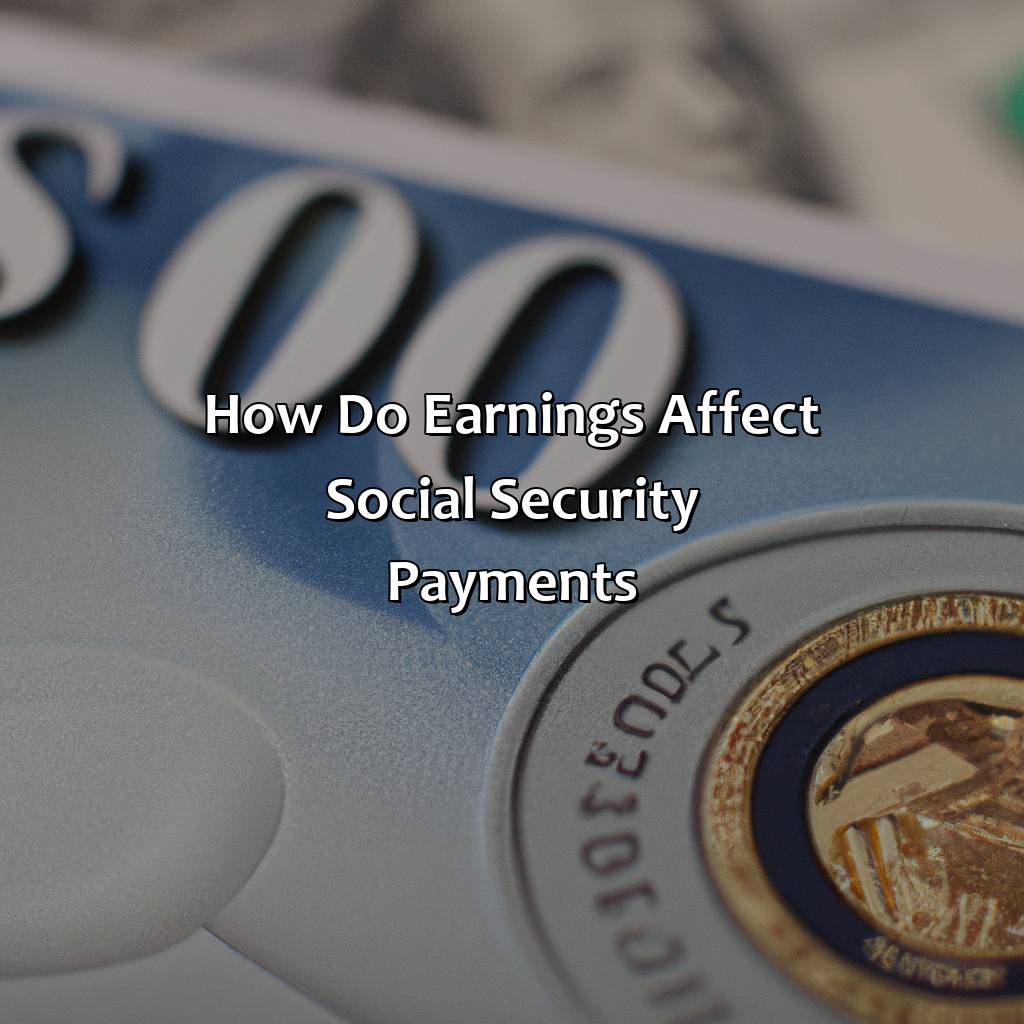How Do Earnings Affect Social Security Payments?
Key Takeaway:
- Earnings can affect Social Security payments in retirement, disability, and survivor benefits.
- For retirement benefits, earning over a certain threshold can lead to a reduction in benefits. However, this reduction is temporary and the benefits will be recalculated at full retirement age.
- For disability benefits, earning above the substantial gainful activity level can result in a loss of benefits. However, there are exceptions for those undergoing a trial work period and those with disabilities not related to their work.
- For survivor benefits, earning over the annual limit can lead to reduced benefits. However, this limit only applies to survivors who have not yet reached full retirement age.
With the future of Social Security in question, you may be wondering how much your income can affect your Social Security benefits. This article will explore how earnings limit Social Security payments and how to ensure you and your family get the most out of your benefits.
Earnings and Social Security Payments
In the world of finance and retirement planning, understanding the relationship between one’s earnings and social security payments is crucial. Social security payments are calculated based on a number of factors, including the individual’s lifetime earnings.
In this article, we delve into the impact of earnings on social security payments with a focus on the following areas.
Firstly, let’s take a look at how the earnings test affects social security payments. The earnings test is a tool used by the Social Security Administration to determine whether an individual is entitled to a full benefit payment. The table below illustrates the current earnings test thresholds and the corresponding effect on monthly benefits:
| Earnings Threshold | Monthly Benefit Reduction (for every $2 earned over threshold) |
| $18,960 | $1 reduction |
| $50,520 (for those turning 66 in 2021) | $1 reduction |
Keep in mind that earnings above the threshold may cause a reduction in the monthly benefit payment, but those reductions will be recouped through an increase in the benefit once full retirement age is reached.
Next, it is important to consider the impact of delaying social security benefits on one’s earnings and future payments. By delaying receiving benefits, an individual can increase their monthly payments by a certain percentage depending on their birth year. For example, someone born in 1943 or later can receive an 8% increase in their monthly benefits for each year they delay up until age 70. This can result in a significant increase in total benefits over the course of the individual’s lifetime.
Lastly, it is advisable to consult with a financial advisor or social security specialist to maximize your benefits and avoid any missed opportunities. Don’t miss out on potential earnings that could increase your social security payments. Act now and plan for your retirement with confidence.

Image credits: retiregenz.com by James Jones
Social Security Retirement Benefits
Grasping your Social Security retirement advantages? It’s crucial to recognize the influence of earnings on these payments. Maximize your benefits!
This section “Social Security Retirement Benefits” with sub-sections “How Earnings Affect Retirement Benefits” and “Earnings Test and Retirement Benefits” will enlighten you on how earnings may affect the amount you receive, and how the earnings test functions.

Image credits: retiregenz.com by Yuval Washington
How Earnings Affect Retirement Benefits
As per the Social Security Administration, the earnings of a person affects their retirement benefits. The amount of income a person earns during their working years directly impacts the amount they receive in social security payments when they retire.
When an individual continues to work while receiving retirement benefits, their earnings may temporarily reduce their benefit amounts. However, once they reach full retirement age, there will be no reduction in payment regardless of how much they earn.
It is worth noting that if an individual decides to take early retirement, any income earned above a certain limit could result in a reduction in their monthly payments.
Ultimately, it is important to understand how earnings play a role in determining Social Security Retirement Benefits to ensure you make informed decisions on your financial planning for the future.
Ensure you understand how your earnings affect your social security benefits to avoid missing out on potential monetary benefits that could support a comfortable and secure retirement.
Looks like the government wants us to work hard until the very end, even if it means sacrificing a few Social Security benefits along the way.
Earnings Test and Retirement Benefits
Social Security benefits are affected by your earnings. If you earn money while receiving retirement benefits, the Earnings Test determines how much you can earn before your benefits are reduced. Social Security will reduce your benefits if you exceed the limit. The reduction is based on a complex formula that takes into account your age and how much you have earned above the threshold.
This test applies only until you reach full retirement age, which varies depending on the year you were born. After reaching full retirement age, Social Security will no longer reduce your benefits based on how much you earn.
It is important to note that not all types of income count towards the Earnings Test. For example, income from investments or pensions does not affect Social Security payments.
A little-known fact is that in 1939, President Franklin Roosevelt signed an amendment to the Social Security Act that created benefit payments for surviving widows and children who had lost their breadwinner father. This amendment helped millions of families during times of hardship and remains an essential part of Social Security today.
Looks like being disabled has one small perk – you might actually qualify for Social Security Disability Benefits.
Social Security Disability Benefits
To comprehend how Social Security Disability Benefits operate & how they can be altered by your earnings, explore the subsections of “How Earnings Affect Disability Benefits” & “Substantial Gainful Activity and Disability Benefits”.
Uncover how earning above a certain limit can cut down or end disability benefits. Plus, find out what counts as substantial gainful activity according to Social Security earning rules.

Image credits: retiregenz.com by Harry Jones
How Earnings Affect Disability Benefits
Social Security Disability Benefits can be affected by the amount of earnings a person makes. This is because disability benefits are calculated based on the individual’s average lifetime earnings. If the individual has worked and earned more, then their benefit payment may be higher. However, if they continue to work and earn more while receiving disability benefits, their payments may decrease.
Additionally, there is a threshold known as Substantial Gainful Activity (SGA) that determines whether an individual is eligible for disability benefits or not. If an individual earns over a certain amount each month, which is adjusted every year, then they are considered to be engaging in SGA and may lose their eligibility for disability benefits.
It’s important to note that there are programs like Ticket to Work or Trial Work Period that can allow individuals to test their ability to work without affecting their benefit payments or eligibility status. By utilizing these programs, individuals can gradually ease back into the workforce and become self-sufficient while still receiving necessary support.
Too sick to work, but not sick enough to escape the government’s watchful eye on your earnings – welcome to social security disability benefits!
Substantial Gainful Activity and Disability Benefits
For individuals seeking Social Security Disability Benefits, it is important to understand the concept of engaging in a ‘substantial gainful activity’. Such activity refers to an individual’s capacity for engaging in work that provides significant earnings. This can impact the amount of benefits they are entitled to receive.
If an individual is working and earning more than the threshold set by the SSA, they are presumed not to be disabled and, therefore, not eligible for benefits. The threshold amount changes annually and varies according to age, blindness, or other disabilities an individual may have. In short, if one engages in substantial gainful activity, their disability issue might be negated.
It’s crucial to note that certain deductions can be made from an individual’s earnings when factoring if their income exceeds the threshold limit. For instance, taxes withheld from an individual’s wages can often be deducted while calculating “countable income”. Exclusions for expenses related to the person’s impairment which make it possible for them to work may also be permitted.
A key consideration for those who are receiving Social Security Disability Benefits is finding ways to maintain employment without exceeding substantial gainful activity thresholds. This may involve consulting with a qualified SSDI professional or vocational rehabilitation specialist who can provide advice on how best to maximize earnings within allowable limits.
Ultimately, individuals seeking Social Security Disability Benefits should stay informed about current regulations and guidelines concerning substantial gainful activity and seek professional assistance as needed to ensure they continue receiving critical financial support.
Who said death has to be all bad? With Social Security survivor benefits, your loved ones can still cash in on your hard work even after you’re gone.
Social Security Survivor Benefits
Understand how earnings influence Social Security survivor benefits? Focus on the section on Social Security survivor benefits. We’ll explore two sub-sections:
- “How Earnings Affect Survivor Benefits“
- “Earnings Limit and Survivor Benefits“
These will give you the info you need to decide on your survivor benefits in an informed way.

Image credits: retiregenz.com by Harry Arnold
How Earnings Affect Survivor Benefits
After a loved one dies and you become eligible for survivor benefits, the amount you receive from Social Security can be affected by your earnings. The impact of your income on these payments depends on various factors, including both your own work history and that of your deceased spouse or parent if you’re receiving dependent benefits.
If you’re under full retirement age, your monthly survivor benefit may be reduced if you earn over a certain threshold. For every two dollars earned over the limit ($18,960 in 2021), one dollar will be subtracted from your payment. Once you reach full retirement age, this rule no longer applies, and you can earn as much as you want without reducing your benefits.
It’s important to note that this reduction only applies to the survivor benefit portion of your payment, not any other Social Security benefits you may be eligible for based on your own work record. Additionally, there is no cap on how much money you can earn while still receiving survivor benefits — once you reach full retirement age, your earnings will no longer affect your payments.
Pro Tip: If you’re nearing retirement age and considering filing for Social Security survivor benefits while still working, make sure to plan accordingly. You may also want to speak with a financial advisor or accountant who can help you optimize your strategies for maximizing both income and eligibility requirements.
Earnings Limit and Survivor Benefits
Survivor Benefits and Earnings Limit determine the amount of social security benefits a person can receive. Here are some key points to keep in mind when understanding how these factors influence your social security payments:
- There is a limit to how much an individual can earn and still receive survivor’s benefits.
- If you earn more than the earnings limit while receiving survivor benefits, your payment will be reduced.
- The reduction in payments occurs from age 60 until the surviving spouse reaches full retirement age.
- Once the surviving spouse reaches full retirement age, there is no longer an earnings limit on social security payments.
It is essential to understand that earning over a specific amount while receiving survivor benefits may result in a significant reduction in payments. So it’s better not to rely entirely on survivor benefits when planning for your financial future.
As each case is unique, it is crucial to consult Social Security Administration professionals before making any financial decisions related to survivor benefits. Don’t miss out on understanding all available options and resources by proactively reaching out to Social Security Administration professionals.
Some Facts About How Earnings Affect Social Security Payments:
Social Security payments may be reduced if earnings exceed certain limits. (Source: Social Security Administration)
The earnings limit for individuals receiving Social Security retirement benefits in 2021 is $18,960. (Source: AARP)
For those who will reach full retirement age in 2021, the earnings limit is $50,520, but only applies until the month they turn full retirement age. After that, earnings do not affect benefits. (Source: Social Security Administration)
If benefits are reduced due to earnings, they may be recalculated at full retirement age to factor in the months in which benefits were withheld. (Source: Social Security Administration)
There is no earnings limit for those who have reached full retirement age. (Source: Social Security Administration)
FAQs about How Do Earnings Affect Social Security Payments?
How do earnings affect social security payments?
Earnings can affect your social security payments depending on the amount you earn and your age.
Can earning too much affect my social security payments?
If you are under full retirement age, earning too much can reduce your social security payments. However, once you reach full retirement age, you can earn any amount without affecting your payments.
What is the earnings limit for social security payments?
In 2021, the earnings limit for those under full retirement age is $18,960. If you earn above this amount, your social security payments will be reduced.
Are all types of earnings counted towards the limit?
No, only earned income counts towards the earnings limit. This includes wages, self-employment income, and bonuses. Investment income does not count towards the limit.
What happens if I earn above the limit?
If you earn above the limit, your social security payments will be reduced by $1 for every $2 you earn above the limit. However, once you reach full retirement age, this rule no longer applies.
Can I get my reduced benefits back once I reach full retirement age?
Yes, once you reach full retirement age, your social security payments will be recalculated to account for any benefits that were previously withheld due to the earnings limit.
 Checkout this IRS Loophole
Checkout this IRS Loophole 
